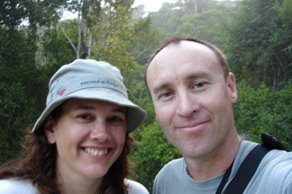Dia de Independencia
(Ed. note: Two posts the same day, so don´t miss the one that I placed before this one!)
So, after all of these wordy blog entries, it’s time for one that is mostly handled by pictures. Luckly we just had a very photographic event to help me out. September 15th is the Dia de Independencia in El Salvador, and in fact for all of Central America. Here it is a big community event, taking weeks of preparation, with most of the work falling on the school who plans and manages the activities, but also reaps the results in terms of monetary gains. In fact this event is where the money to cover all of the costs for the computers will come from.
About a month ahead of time school changes around a bit to accommodate the new activity of learning and practicing marching, with a few also learning to play drums or trumpets. This is a big event, and I will just let the photos tell the story of how it unfolds on the big day.
The rest of this will just be comments on the photos, with the exception that I will explain the whole candidata to queen thing in a bit more detail.
 Here is how the parade starts out, with the twirlers.
Here is how the parade starts out, with the twirlers.
Then comes the trumpets and drums.

Then the Flags.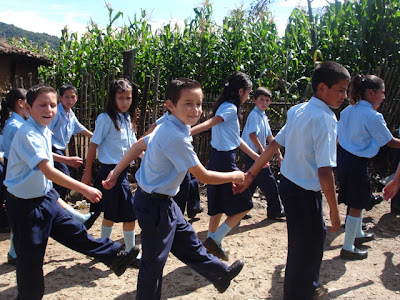

Then lots of marchers, arranged by classes.

This is a look at the parade coming down ¨main street¨. Thought you might like to see how that looks.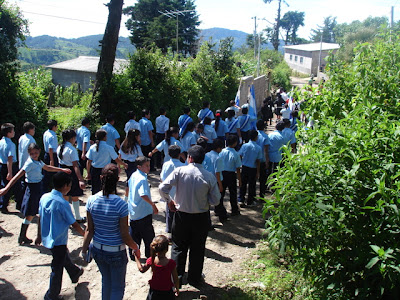

Here is looking the other way down the street as the parade passes by.

More marching. These guys have bands on them, not sure what it meant, but they had a higher rank.

These girls were the younger twirler types. I took photos of them in the parade, but this one taken after shows them better.

There is a lot of makeup prep before the whole thing. This is one of the twirlers getting ready.

This is another of the dancing type groups slotted in between different classes. They have on what is considered the more traditional outfits for dancing. The girl in front there, is the youngest daughter of the family we live with, Carina.

These are some of our instituto friends, in not so traditional outfits.

After the parade everyone comes to the school to buy and eat lots of food. Katie was busy selling her fudge, even at 20 cents a piece (very expensive), she sold it all!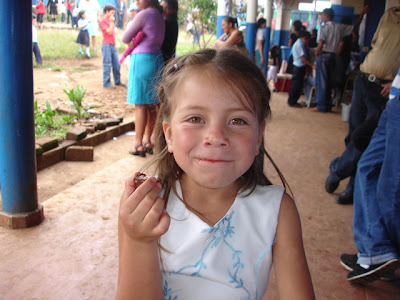

A satisfied chocolate lover after visiting Katie´s stand.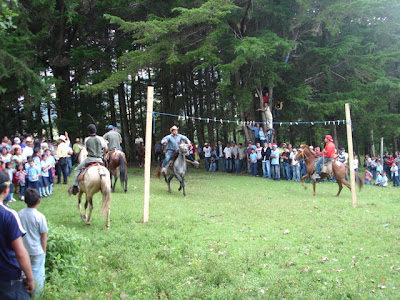

This is one of the other events. A ¨correos de cinta¨. Here the guys ride horses and try to lance a leather strap help up by the posts and string.

Here is, I think, a successful capture!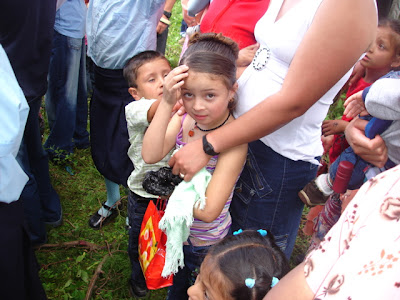

When they make a capture, it will have a number on it. That number corresponds to some young girl like this one who is what is called a ¨madrina¨and she gives a small present to the rider. If it is an older girl, and she is cute, she might be coerced into a kiss.

Another aspect of this kind of event, is that you have to have a queen! Here are two of the ¨candidatas¨. We were ¨padrinos¨to the one in front, which is my counterparts daughter. This means we gave her money, and sold votes (5 cents per vote) for her over the previous 2 weeks.

Katie with the winner and queen, our candidata, Ana!

Ana with her brother and sister. This is one of the families that we visit and spend time with.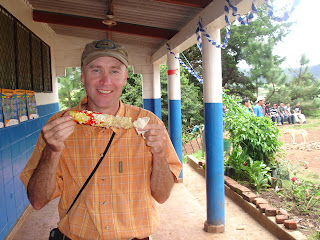

Here is the last picture, one of me eating an elote loco. A rather disgusting mix of corn on the cob covered with mayo, ketchup, creama, cheese...maybe more, but that´s all I remember right now. This, and the one above of Katie also shows how we are dressed most of the time around our site. No T-shirts and shorts here! Hope you enjoyed all of the photos! It takes too much time to do this often though, so don´t come to expect it :-)
